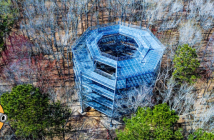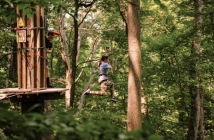The question: I saw a story about a branch falling on a zip line, and I was wondering, how do I know if your trees are safe?
We try not to throw any curveballs in Park Spy missions (unless it’s a blatant screwball, of course, which we’re upfront about), and this question seemed uncomplicated to us considering, you know, lots of zip line tours travel past trees and stuff. And even if the most recent news cycle didn’t include an incident involving a branch (or tree) falling on a zip line, news of past incidents isn’t hard to find. Plus, branches fall on zip lines—sometimes harmlessly, sometimes resulting in tragedy.
The point is, many staffers reacted as if this question was a curveball when they simply could have eased the Spy’s concerns with some polite reassurance. A couple folks did that and scored high as a result. The rest, however, either got defensive or were rudely ignorant in response to the question. One may think we were talking to jaded, tired staffers in late October, not freshly trained employees with fresh attitudes in May.
Been asked an interesting question this season? Send it to [email protected] for the Spy to pose to other parks! We won’t tell anyone the question came from you. Plus, if we use it, your park will be immune for that issue.
PARK #1, CA
First Contact: Female.
API: Stated question.
Staff: Um, may I ask where you saw that?
API: I just saw an article about it while I was browsing the internet. I can’t remember the park’s name.
Staff: (annoyed) What was that?
API: I just saw it (interrupted…).
Staff: (rude) A news story? Well, that’s interesting. Um, so I can tell you that we go on a course inspection every single day before guests go out there. We are highly regulated. Our number one priority is safety here. Um, that’s really all I have to say about that.
API: Great, thanks for explaining that.
Staff: And I will be looking into that story so thanks for bringing it to my attention.
API: Yeah, no problem.
Staff: Can I help you with anything else today?
API: No, that was it. Thank you.
Staff: No problem, have a great day!
Score: 4
Comment: Good to know they inspect daily and are highly regulated, but a more thorough explanation when talking to a worried customer was needed—and getting defensive, and being rude, was not OK.
PARK #2, NJ
First Contact: Female.
API: Stated question.
Staff: (snippy) What are you asking?
API: I was wondering how you make sure your trees are safe for zip-liners?
Staff: (annoyed) Oh, well, we do daily inspections.
API: OK. What does that entail?
Staff: I am not sure (long pause…). I can see if someone here knows.
(on hold…)
Our manager is out on the course now, but I can have him give you a call.
API: That would be great, thanks. (gives contact information)
Staff: OK. Someone will be in touch.
API: Thank you.
Staff: Yep, goodbye.
Score: 2
Comment: Interpersonal communication is clearly not her strength. It’s OK to not know the answer, but it’s not OK to act like you don’t need to know the answer. From her attitude, I feel like my contact information ended up in the garbage.
PARK #3, MN
First Contact: Male.
API: Stated question.
Staff: I never heard that story. Which park was that at?
API: I can’t remember the name of the park, but I saw it when I was scrolling the internet.
Staff: (uninterested) OK, yeah, that’s just surprising to hear.
API: I figured it was fairly normal since most zip lines are through the trees.
Staff: (annoyed) No, it’s not common.
API: OK. Do you do checks or anything on the zip line?
Staff: Yeah, we do safety checks every morning before we let guests on. We have a list that we go through.
API: OK, is there anything else I should know to make me feel more comfortable?
Staff: No, we run things pretty safe here, so you’re good.
API: Alright, thank you.
Staff: Yep, goodbye.
Score: 3
Comment: “We run things pretty safe here” sounds like he has no clue about the tour’s procedures and doesn’t ease the worries of a potential customer.
PARK #4, VA
First Contact: Male.
API: Stated question.
Staff: (sincere) Um, how you would know if our trees are safe?
API: Yes, exactly.
Staff: So, we do inspections every day before the course opens and the surrounding areas of the course itself. We make sure there are no dead branches or things above that would potentially fall. We do a thorough check during all points of the course.
API: Oh, great, thank you!
Staff: Yep, does that answer your question?
API: Yes, it does. Thanks for explaining that.
Staff: Have a great day!
API: You too, goodbye.
Score: 8
Comment: Was that so difficult?!? He took the time to explain their inspection process and didn’t make me feel bad for asking. Easy peasy. Nice work.
PARK #5, TN
First Contact: Female.
API: Stated question.
Staff: Um, I haven’t heard anything about that, and I have been here for a while.
API: I wasn’t saying it was at your park, I just saw a story about it.
Staff: (uninterested) OK. Yeah, I haven’t heard of any accidents or anything about the trees.
API: OK.
Staff: Yeah, like, nothing.
API: OK, but do you do any safety checks or anything? I just want to feel comfortable.
Staff: Yeah, they do safety checks all the time and check the wires.
API: OK. Anything concerning the trees, though?
Staff: (annoyed) Well, we are fully insured so we check everything.
API: Oh, OK.
Staff: Yep, you have a good day (hangs up).
Score: 1
Comment: Seriously? She should have gone into more detail about their safety checks or grabbed someone who knows the process. Her horrible attitude was the rotten icing on the cake.
PARK #6, WI
First Contact: Male.
API: Stated question.
Staff: (sincere) How would you know?
API: Yes.
Staff: We get inspected annually by an arborist as well as a third-party inspector. So, we always do our annual inspections and then we do monthly inspections, which I personally do as an owner. Then we do daily inspections.
API: Oh, great.
Staff: And then, as a company, the easiest way we see if a tree is dead or alive is looking at the leaves. So, if you’ve got green leaves, the tree is alive and if you have brown leaves then you probably shouldn’t be doing zippers on it. If that makes sense?
API: Yes, it does. Thank you for explaining all of that.
Staff: Obviously, branch losses are the easiest way to say, “Hey, we might have an issue here.” And if we ever were to see that then we’d call out our arborist and they would do a more detailed inspection. Since, you know, they are the tree experts (chuckles).
API: That definitely answers my question. I appreciate that you rely on the experts.
Staff: But, you know, if little limbs fall here or there, you know, if you have a storm anywhere by your house, you’re obviously going to see some little limbs on the ground. So, I am not sure what kind of story you heard as far as big or little tree limbs, but little limbs are common to fall off of trees.
API: Right, that’s totally understandable.
Staff: Yep, they don’t do any damage or anything.
API: Well, great. Thanks for taking the time to explain everything!
Staff: No problem. Have a good one.
Score: 10
Comment: Folks, that’s how you do it! Of course, as the owner (and clearly the operator, too) he has more knowledge and more of a vested interest in treating a caller nicely than, say, most of the other staffers I spoke to. Nonetheless, he cared about putting my worries to rest and it was refreshing for him to take the time to explain.
Identity Revealed: Northwoods Zipline Adventure Tours
Debrief:
Perhaps we should consider changing the name of this regular feature from “Park Spy” to “Just Be Nice” since that tends to be the most common nugget of advice doled out here. If your operation still has humans answering the phone (which, despite what some may think, will always be the best approach to customer service—sorry, AI), they should know that being nice goes a long way. A staff member’s attitude on the phone can make or break a guest’s impression of a business.
Now, back to the whole branches on zip lines thing. In speaking to arborists and inspectors, the feeling is operators care a lot about the trees that support their zip lines and platforms, but don’t always give the same attention to the trees surrounding the lines. An arborist inspection of a full zip-line course is not cheap, but investing in identifying potential hazards before they become a problem is money well spent.
Of course, trees can be unpredictable. Extreme weather can introduce hazards among your trees that didn’t exist before. But that doesn’t mean it’s OK to ignore the trees within reach of your infrastructure and the people using it.
Plus, it’s comforting for staff members to be able to confidently tell a potential guest that your operation does everything in its power to ensure the trees around your course are a beautiful part of the landscape, not safety hazards.






